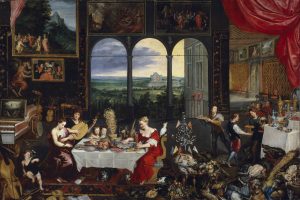Since our weekly Torah portion mentions the prohibition of drinking alcohol by the priests who were serving God, I thought it might be a good opportunity to talk a bit about the etymology of the Biblical Hebrew word for ‘liquor’. First let’s have a look at what is written about the prohibition of drinking alcohol:
“And the LORD spoke to Aaron, saying, “Drink no wine or strong drink, you or your sons with you, when you go into the tent of meeting…” (Leviticus 10:8-9)

The original Hebrew word for ‘strong drink’ is ‘She’char’ {שיכר} and in almost all cases that it appears in the Hebrew Bible, this word comes together with the Hebrew word ‘Ya’in’ {יין} which means ‘wine’ in English.
Even though beer was in use in the Ancient East (was called ‘Sikru’ in Akkadian), there is no evidence that the ever Israelites drank this alcoholic beverage. In fact, in many biblical references to the word ‘Anavim’ {ענבים} which means ‘grapes’ is mentioned next to the Hebrew word ‘She’char.’ This grammatical construction suggests this beverage was made out of grapes and not cereal grains like beer.
In the Old Latin translation of the Hebrew Bible, this word was translated as ‘inebriare’ which means ‘inebriate’ in English (derived from the Latin word ‘ebrius’ which simply means ‘drunk’).
From the name of this alcoholic beverage in Hebrew – She’char’ – derived the adjective form which is ‘Shee’kor’ {שיכור} (‘drunk’) and can be found in the story of Samuel’s birth, for example:
“Hannah was speaking in her heart; only her lips moved, and her voice was not heard. Therefore Eli took her to be a drunken woman. And Eli said to her, “How long will you go on being drunk? Put your wine away from you.” (1 Samuel 1:13-14)
During biblical times, when a person wanted to leave everything behind and to dedicate his life to God (usually after he sinned), he had to take upon himself a promise not to drink ‘She’char’ at all. The Torah called this person in Hebrew ‘Nazir’ {נזיר} and the verb for becoming one is ‘Le-Hitnazer’ {להתנזר} which translates to English as ‘to abstain’.
And finally, the reason why the priests in the Tabernacle were not allowed to drink any alcohol while serving there is found in the next verse which follows the ones we mentioned at the beginning of this post:
“You are to distinguish between the holy and the common, and between the unclean and the clean.” (Leviticus 10:10)
